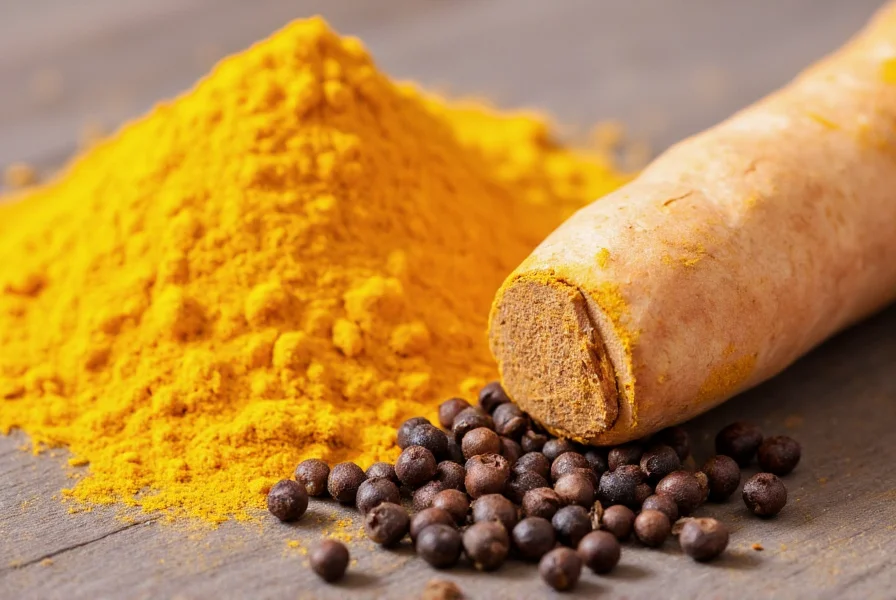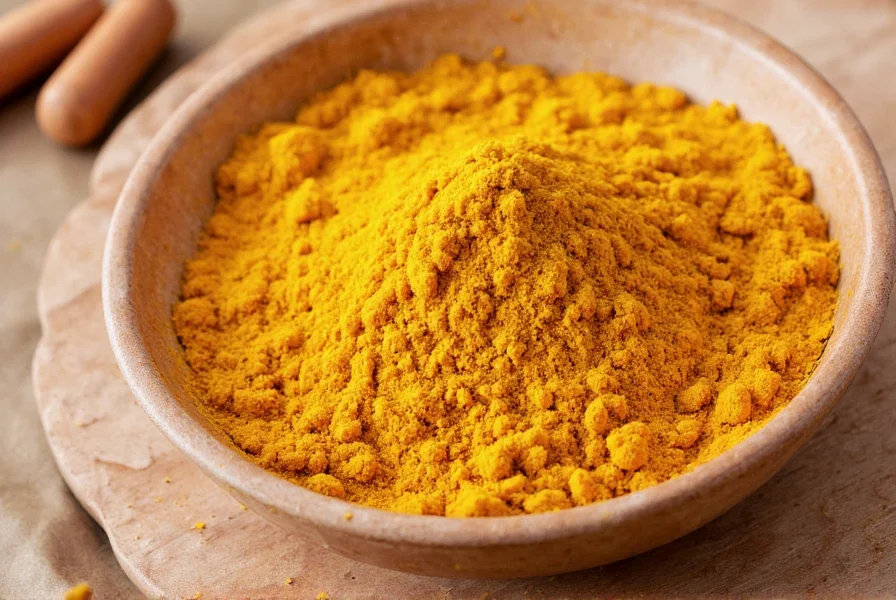Turmeric isn't just a vibrant yellow spice that gives curry its distinctive color—it's a powerhouse of health-promoting compounds with thousands of scientific studies backing its benefits. The golden root has been used in traditional Ayurvedic and Chinese medicine for centuries, but modern research is now validating many of these ancient applications while uncovering new potential uses.
The Science Behind Turmeric's Healing Properties
Curcumin, turmeric's primary active compound, accounts for about 2-8% of most turmeric preparations and is responsible for most of its scientifically documented benefits. This polyphenol possesses remarkable biological properties, though it faces challenges with bioavailability—meaning your body doesn't easily absorb it. When consumed with black pepper (which contains piperine), curcumin absorption increases by up to 2,000%, making this combination significantly more effective.

Evidence-Based Health Benefits of Turmeric
What is turmeric good for according to rigorous scientific research? Let's examine the most well-documented benefits:
Powerful Anti-Inflammatory Effects
Chronic inflammation contributes to nearly all modern diseases, from heart conditions to cancer. Curcumin's anti-inflammatory properties rival some pharmaceutical drugs without the side effects. A comprehensive review published in Journal of Medicinal Food concluded that curcumin "demonstrates anti-inflammatory activity comparable to ibuprofen and diclofenac sodium" but with better safety profile.
What is turmeric good for inflammation specifically? Research shows it inhibits multiple molecules involved in inflammation pathways, including NF-kB, cytokines, and enzymes like COX-2. This makes turmeric benefits for joint pain particularly noteworthy for people with osteoarthritis and rheumatoid arthritis.
Joint Health and Arthritis Relief
Multiple clinical trials confirm turmeric's effectiveness for joint conditions. In a study comparing curcumin to diclofenac sodium for rheumatoid arthritis, the curcumin group showed the most significant improvement in disease activity scores. Another trial found that 1,500 mg of curcumin daily reduced osteoarthritis pain as effectively as ibuprofen, but with fewer gastrointestinal side effects.
| Condition | Study Results | Recommended Dosage |
|---|---|---|
| Osteoarthritis | 58% pain reduction after 8 weeks | 1,000 mg curcumin daily |
| Rheumatoid Arthritis | 44% improvement in disease activity | 500 mg curcumin twice daily |
| General Inflammation | 29% reduction in inflammatory markers | 500-1,000 mg curcumin daily |
Antioxidant Powerhouse
Turmeric benefits extend to combating oxidative stress, which damages cells and contributes to aging and disease. Curcumin neutralizes free radicals while also stimulating the body's own antioxidant enzymes. This dual action makes turmeric particularly effective for what turmeric is good for cellular protection. Research shows curcumin's antioxidant capacity may help protect against neurodegenerative diseases by reducing oxidative damage to brain cells.
Heart Health Support
Is turmeric good for heart health? Evidence suggests yes. Curcumin improves endothelial function—the lining of blood vessels that regulates blood pressure and clotting. A study in Nutrition Research found that taking curcumin supplements for 8 weeks significantly improved blood vessel function in postmenopausal women, comparable to the effects of exercise. Turmeric may also help lower LDL cholesterol and triglycerides, though more research is needed in this area.
Brain Function and Mood Enhancement
Curcumin increases levels of brain-derived neurotrophic factor (BDNF), a growth hormone that functions in the brain. Low levels of BDNF are linked to depression and Alzheimer's disease. Clinical trials show that curcumin supplementation can improve memory and attention in healthy older adults and may help alleviate symptoms of depression. A 12-week study published in the Journal of Affective Disorders found curcumin was as effective as Prozac for managing mild-to-moderate depression.
Digestive Health Benefits
What is turmeric good for digestion? Traditional medicine has long used turmeric to support digestive health, and modern science confirms these benefits. Curcumin stimulates bile production, which aids fat digestion. Research shows turmeric may help manage symptoms of irritable bowel syndrome (IBS) and inflammatory bowel diseases like Crohn's disease and ulcerative colitis by reducing gut inflammation.
Practical Guidance: How to Use Turmeric Effectively
Understanding what turmeric is good for means knowing how to incorporate it effectively:
Dietary Incorporation
The simplest way to benefit from turmeric is through dietary inclusion. Add 1-2 teaspoons of turmeric powder to soups, stews, rice dishes, or smoothies. For better absorption, always pair turmeric with black pepper and a healthy fat like coconut oil or olive oil.
Supplement Considerations
For therapeutic benefits, supplements often provide more consistent dosing. Look for products containing 95% curcuminoids with piperine (black pepper extract). Standardized extracts typically provide 500 mg of curcuminoids per capsule. Most research uses doses between 500-2,000 mg of curcumin daily, divided into multiple doses.
Safety and Potential Side Effects
Turmeric is generally safe when consumed in food amounts. Higher supplement doses may cause mild digestive upset in some people. Those with gallbladder issues should consult a healthcare provider before using turmeric supplements, as it may stimulate bile production. Turmeric may interact with blood thinners, so discuss with your doctor if you take these medications.
Limitations and Research Status
While turmeric shows remarkable promise, it's important to understand the current research limitations. Many studies use high-dose curcumin supplements rather than dietary turmeric. The bioavailability challenge means that simply adding turmeric to food provides limited benefits without proper formulation. Most clinical trials have been relatively small and short-term, though the consistency of findings across studies is encouraging.
Frequently Asked Questions About Turmeric Benefits
What is turmeric most effective for?
Turmeric, specifically its curcumin compound, is most effective for reducing inflammation and providing antioxidant protection. Research shows it's particularly beneficial for joint health, with multiple studies confirming its effectiveness for osteoarthritis and rheumatoid arthritis symptoms. The anti-inflammatory effects work by inhibiting key inflammatory pathways in the body, making turmeric a valuable natural option for managing chronic inflammation.
How long does it take for turmeric to work for inflammation?
Most clinical studies show noticeable reductions in inflammatory markers within 4-8 weeks of consistent use. For joint pain relief, many people report improvement within 2-4 weeks when taking standardized curcumin supplements (typically 500-1,000 mg twice daily). Dietary turmeric alone may take longer to show effects due to lower bioavailability, which is why combining it with black pepper significantly enhances results.
Can turmeric help with arthritis pain?
Yes, multiple clinical trials confirm turmeric's effectiveness for arthritis pain. A study published in the Journal of Medicinal Food found that 1,000 mg of curcumin daily reduced osteoarthritis pain as effectively as 1,200 mg of ibuprofen, but with fewer gastrointestinal side effects. For rheumatoid arthritis, research shows curcumin supplementation significantly reduces disease activity scores and joint tenderness. The anti-inflammatory properties target the root cause of arthritis pain rather than just masking symptoms.
What's the best way to absorb turmeric?
The best way to absorb turmeric is by combining it with black pepper and a healthy fat. Piperine in black pepper increases curcumin absorption by up to 2,000%. Consuming turmeric with fats like coconut oil, olive oil, or avocado enhances its bioavailability since curcumin is fat-soluble. For therapeutic benefits, look for supplements that include piperine or use phospholipid delivery systems. When using culinary turmeric, add a pinch of black pepper and cook with healthy fats for maximum benefit.
Are there any side effects of taking turmeric daily?
Turmeric is generally safe when consumed in food amounts. At higher supplement doses (typically above 8 grams daily), some people may experience mild digestive issues like nausea or diarrhea. Those with gallbladder problems should consult a doctor before using turmeric supplements, as it may stimulate bile production. Turmeric may interact with blood thinners, so discuss with your healthcare provider if you take these medications. For most people, moderate daily use of culinary turmeric or standard supplement doses (500-2,000 mg curcumin) is well-tolerated.











 浙公网安备
33010002000092号
浙公网安备
33010002000092号 浙B2-20120091-4
浙B2-20120091-4